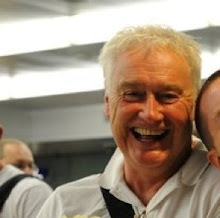 Lord Andrew Lloyd Webber is not a well man. His operation for prostate cancer before Christmas led to complications and Love Never Dies may be his last composition, since he’s now producing Wizard of Oz rather than developing new material. I hope not, because the author of Sunset Boulevard and Evita deserves a better epitaph than the load of old rope currently on full-price £65-a-seat preview at the Adelphi Theatre.
Lord Andrew Lloyd Webber is not a well man. His operation for prostate cancer before Christmas led to complications and Love Never Dies may be his last composition, since he’s now producing Wizard of Oz rather than developing new material. I hope not, because the author of Sunset Boulevard and Evita deserves a better epitaph than the load of old rope currently on full-price £65-a-seat preview at the Adelphi Theatre.We are in Coney Island, and if Lloyd Webber’s claim that the events are set ten years after Phantom of the Opera is accurate, it’s about 1891. The Phantom has become a sideshow illusionist, bringing with him Madame and Meg Giry, and three henchpersons called something like Felch, Squelch and Gargle whose sole purpose is to strut about in Cirque de Soleil costumes. In a barely comprehensible plot, he invites now-famous Christine Daae to sing in his theatre and she arrives aboard the Lusitania with Oscar Hammerstein (who would have been four years old at the time), Nancy Astor (eleven) and Cornelius Vanderbilt (born 1898). Improbable or what?
Christine’s son turns out to be fathered by the Phantom who entertains the ten-year-old in what looks like Michael Jackson’s bedroom, complete with Bubbles the ape maniacally playing a pipe organ. Other elements of scenery are like an Art Nouveau explosion in a resin factory, interspersed with trapeze and rope twirling from a provincial circus.
ALW’s form is distinctly variable: whilst Cats and Evita pushed the envelope of musical theatre his recent appearances on low-rent television stunts like ‘Any Dream Will Do’ have diminished his profile which was equally dented by penning the dire Eurovision entry 'It's My Time' which I have previously suggested took him precisely three idle minutes to write, including standing up, flushing and washing his hands afterwards.
It now seems outrageous that he should be the recipient of a peerage for his contribution to the nation’s musical heritage, an honour not accorded Purcell, Delius or Elgar.
He does, however, deserve some sort of national award for recycling.
The lead-up to Christine’s performance of the theme song is interminable and gives you time to reflect it’s not a new tune. Setting aside the internet gossip which invites comparison between ALW’s composition and the theme from 1960’s Shirley MacLaine movie ‘The Apartment’, ‘Love Never Dies’ is itself a re-hash of ‘Our Kind of Love’ cut from his musical ‘The Beautiful Game’, stripped of its meaningful lyrics, jacked up an octave and given ludicrous operatic pretensions and drowningly lush orchestration.
Whilst Serena Boggess looks stately – the pink crystal-studded frock is simply gawjus – and sings right to the top of her soprano range until you wonder whether bats will fall from the rafters with their wings over their ears, it’s a soulless performance made even less engaging because it’s so difficult to care about any of these characters.
It’s tantalizing to wonder what might have happened if Christine had been made fully three dimensional, and the piece sung in a normal register with emotion by Hannah Waddingham – as she did on Parkinson some years ago - then this could have been the most electrifying sequel.
The pretence that this is somehow an opera score trips ALW up time after time – Ramin Karimloo’s voice seems to have only one setting: ‘stentorian’, and all his interactions with Christine are overblown and overloud. The recitative sounds directly snatched from ‘Sunset Boulevard’ and is endlessly repetitive, whereas a few lines of spoken dialogue and a couple of jokes would have been more than welcome.
The counterpoint popular numbers like Summer Strallen’s Miss Adelaide style vaudeville routine, a fatuous rock anthem, and a chronically forgettable ‘beach’ ensemble seem jarring, as if they belong in three different musicals.
In the bare-stage climax (hm, seen any Bizet, Andrew?) and for no apparent reason, Strallen’s character shoots Christine and a blood capsule explodes in her bra. She dies in the Phantom’s arms as they kiss one last time.
It takes her six minutes, during which she reprises four different tunes before the orchestra wells to the sort of climax normally reserved for the last night of the season at Verona as Tosca chucks herself off the battlements.
Lloyd Webber probably thinks he’s written Carmen.
I think car-crash.




Very well written review John!
ReplyDelete